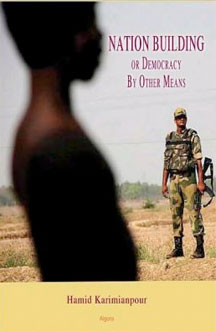
Nation Building or Democracy by Other Means
by Hamid Karimianpour
Algora Publishing, 2011
Excerpt
The President of Carnegie Corporation, Vartan Gregorian (an Iranian-American), suggested in 2009 that President Obama should send a letter of friendship to Tehran. About the American response to the 1979–1980 hostage crisis he proposed that President Obama should write that “[n]o country, certainly no country in possession of the vast power of the United States, would have failed to act under such circumstances. But we restrained our response, because the powerful have the option not to exercise their power…out of a sense of responsibility.”
The draft letter seems to suggest that the US was simply at the liberty to strike Iran if it wanted, but it is doubtful that the US actually did have an option to attack Iran because, firstly, that would have seriously endangered the lives of the American hostages. No use of force could have guaranteed that the hostages would not be killed in the process or that the Iranian students would not harm them in retaliation.
Furthermore, after Carter’s rescue mission failed, it looked more and more like the only military option to free hostages would be a full-scale invasion of Iran. The atmosphere in Iran in 1979–1980 was highly revolutionary and nationalistic. About five to ten million people had taken to the streets for one year to oust the Shah. The Iranian army was in shambles in 1979, but the revolution had created a huge insurgency force that could resist a US invasion. The hostage crisis occurred only four years after the end of the Vietnam War, and the Carter Administration did not seem to be interested in a new war that would uncomfortably look like that of the Vietnam Conflict – especially considering that Iran had common borders with the Soviet Union at the time. The Soviet Union still appeared strong in 1979, and a US invasion of the Soviet Union’s southern neighbor could have involved both of the superpowers in a bloody war.
Finally, the US continued aggressive military interventions – though in smaller scales than that of the Vietnam War – in Latin America throughout 1970s and 1980s. The pattern of the US behavior in this period shows that the US might not have simply restrained itself “out of a sense of responsibility,” if it did believe that it could successfully attack Iran and get away with it. In fact, it is not unreasonable to expect that if Washington believed that it could win a war against Iran, it might have welcomed the opportunity as a way of boosting its image after a humiliating withdrawal from Vietnam.
In his proposed letter to the leaders of Tehran for President Obama, Vartan Gregorian attempted to claim moral credit for not attacking Iran under the hostage crisis. But the decision to not attack Iran seems to have been hinged on strategic, not moral, considerations, and furthermore no nation can claim moral credit for the bad things that it did not do, just as no arsonist can claim moral credit for all the fires he did not (yet) set. Why, Iran could claim moral credit for not killing any of the hostages after all. And to be fair, Iran never called for the extradition and punishment of Kermit Roosevelt for his role in the coup, either.
The fact that the US did not attack Iran militarily does not change the equation. Iran was only lucky to escape a US military response, just as the Eisenhower Administration escaped punishment for its coup in Iran.
AUTHOR
Hamid Karimianpour is a political activist and author with an interest in current affairs and international politics. Karimianpour was born in Iran, where he experienced major political and cultural transformations firsthand following the 1979 Islamic revolution. While still a teenager, he immigrated to Europe. He studied philosophy and economics at the University of Oslo in Norway and did postgraduate studies in philosophy at the University of Hull in the UK. Now an academic residing in Virginia, he has written and edited numerous articles on political and philosophical themes.






